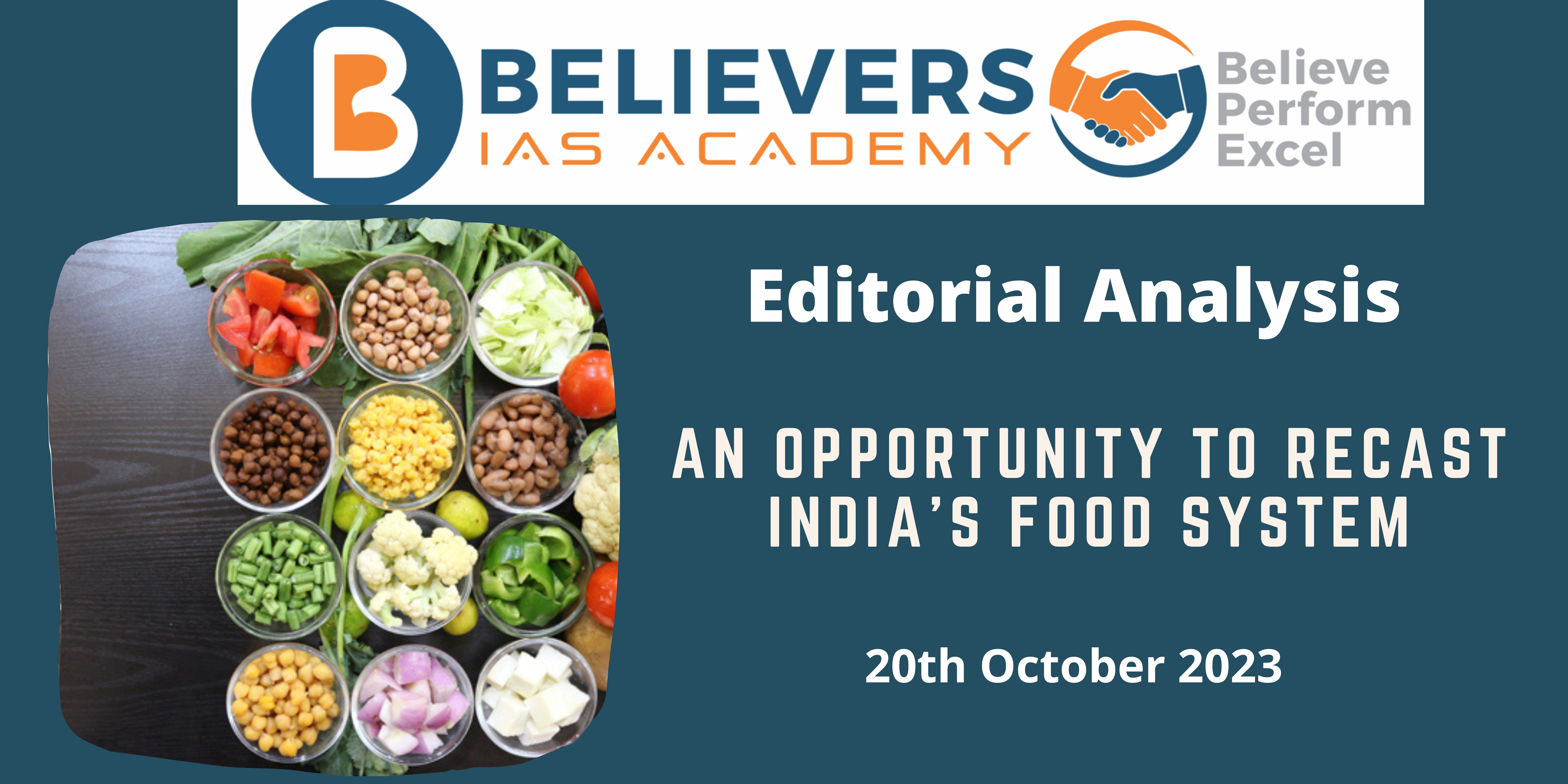An opportunity to recast India’s food system
Context:
India, with its vast population, faces the dual challenge of malnutrition and inadequate farm incomes, intertwined with environmental concerns. To achieve sustainability in the food system, the importance of connecting nutrition security with livelihoods and environmental well-being is of paramount importance.
Relevance:
GS – 02, GS – 03 (Food Security, Types of Resources)
Mains Question:
Analyze the multifaceted challenges within India’s food system, discussing the interplay between nutrition, livelihoods, and environmental security. Propose a three-pronged approach for addressing these challenges effectively.
Dimensions of the Article:
- Malnutrition
- Farm Incomes: An Ongoing Struggle
- Environmental Vulnerability
Malnutrition:
- India confronts a complex nutritional dilemma, marked by dual burdens. Despite commendable progress, a significant portion of the population still grapples with nutrient deficiencies.
- The 2019-21 National Family Health Survey reveals that 35% of children are stunted, and 57% of women and 25% of men suffer from anemia. Simultaneously, imbalanced diets and sedentary lifestyles have led to a surge in obesity, with 24% of adult women and 23% of adult men affected. Efforts, including the Prime Minister’s call for a nationwide anti-malnutrition movement, have been initiated to mitigate this problem.
Farm Incomes: An Ongoing Struggle:
- Farmers, especially marginal and small-scale ones, grapple with inadequate incomes. A Transforming Rural India Foundation report reveals that over 68% of marginal farmers supplement their earnings with non-farm activities.
- This reliance on the Mahatma Gandhi National Rural Employment Guarantee Act (MGNREGA) and casual labor indicates limited opportunities and a lack of skills for income diversification.
Environmental Vulnerability:
- India’s food production faces increasing vulnerability due to depleting natural resources and changing climate patterns. The 2023 soil health survey paints a concerning picture, with almost half of India’s cultivable land suffering from a deficiency in organic carbon, a vital soil health indicator.
- Groundwater, the primary irrigation source, is depleting rapidly, particularly in states like Punjab, where over 75% of groundwater assessment locations are over-exploited, threatening farmers’ income resilience.
Way Forward and Conclusion:
To tackle these interconnected challenges, a comprehensive three-pronged strategy is imperative:
Shifting Consumer Demand for Healthier Diets:
- The transformation begins with shifting consumer demand towards healthier and sustainable diets. The private sector plays a pivotal role in influencing consumption patterns. Lessons from mainstreaming imported food items can be applied to locally-grown millets.
- Collaboration between civil society, health advocates, and social media influencers can promote healthier and sustainable consumption choices. Moreover, public sector interventions, like the Public Distribution System and mid-day meals, can contribute significantly to improving the dietary choices of a substantial portion of the population.
- Religious institutions can also play a role, as evidenced by the Tirumala Tirupati Devasthanam’s procurement of naturally-farmed produce.
Supporting Farmers’ Transition to Sustainable Practices:
- Ensuring resilient incomes for farmers necessitates supporting their transition to remunerative and regenerative agricultural practices. Initiatives like the National Mission on Natural Farming are steps in the right direction, but funding for sustainable agriculture remains meager, comprising less than 1% of the agricultural budget.
- Widening and scaling up such programs to include agroforestry, conservation agriculture, precision farming, and others is crucial. Shifting from input subsidies to direct cash support per hectare of cultivation can promote efficient input usage and create a level playing field for agroecological practices. Agricultural research and extension services should allocate portions of their budgets to sustainable agricultural practices.
Promoting Sustainable and Inclusive Value Chains:
- Enhancing rural incomes hinges on enabling more value addition of agricultural produce within rural areas. Corporations and middlemen should prioritize direct procurement from farmers and incentivize sustainably harvested produce.
- Enterprises like DeHaat and Ninjacart, among others, facilitate direct links between farmers and buyers. Furthermore, enabling produce trading between Farmer Producer Organizations (FPOs) ensures a more equitable share of value for farmers, as exemplified by select FPOs in Odisha.
- Shifting the entire food system is undoubtedly a monumental task, but India possesses a unique opportunity to lead by example. By acting swiftly, India can demonstrate to the world how to establish a sustainable and resilient food system, intertwining nutrition security, livelihoods, and environmental well-being for the betterment of all.



